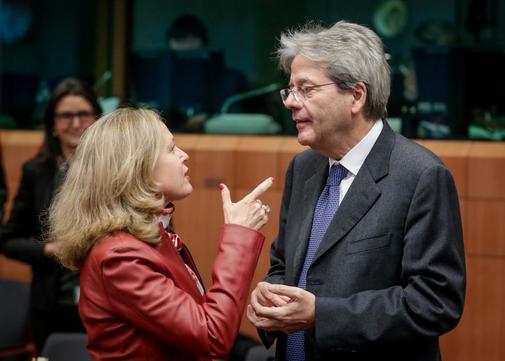- National Accounting: Spain grew by 2% in 2019: the smallest progress since the beginning of the recovery
The third vice president and minister of Economic Affairs and Digital Transformation, Nadia Calviño, has maintained that the European stability pact on deficit and public debt "does not correspond to the economic reality of Spain" , although it does serve other more stable countries, in his words
In an interview this Sunday in La Vanguardia collected by Europa Press, he said that the Government aims to "reduce the public deficit and debt as quickly as possible without jeopardizing economic growth and job creation," while preparing the General State Budgets and projects to introduce new taxes, such as digital tax or financial transactions.
"It is not a negotiation, but a constant dialogue," he said, in relation to the contacts the Executive has with the European authorities on how to comply with the rules of the stability and growth pact of the European Union.
Asked if 2019 has been a lost year for the deficit, Calviño has lamented that it could not be reduced further, despite the fact that they set a goal, 2%, which they have described as ambitious: "What is clear is that since the State has made a tremendously responsible budget management. "
COALITION GOVERNMENT
Calviño has argued that both the PSOE and UP agree on the line of economic action, although "it is practically impossible for the whole of a government the words to be identical" because each person expresses himself in a different way.
"From the point of view of labor marking there are some measures that are urgent , that have broad social support and that have to be addressed as soon as possible," such as dismissals due to medical leave, in his opinion.
Ensuring the sustainability of the Social Security system and presenting the PGE as soon as possible are other of the Government's commitments, said Calviño, who has trusted that the political parties "know how to see the priority that these budgets have for all Spaniards, including the Catalans. " PENSIONS AND SMI
On the Minimum Interprofessional Salary (SMI), he has defended "looking to the future with the aim that all citizens improve their living conditions and have the same rights guaranteeing the internal market", asked what would it seem to apply a lower SMI to Extremadura by the characteristics of its agricultural sector.
"What we see in the Survey of Active Population (EPA) and, in general, of all the data of the labor market, is that the primary sector is registering a negative evolution for a long time" , and has opted to address structural reforms in that sector.
He reiterated the will of the Government to keep the pensions updated according to the Consumer Price Index (CPI): "Our commitment to maintaining purchasing power is clear."
In addition, he has defended the tax increase amounting to 5,700 million -which was already approved by the EU last year, he recalled- since after the blizzard 'Gloria' "nobody doubts the importance of adopting adaptation measures and climate change mitigation "so that Spain meets international goals and grows in a sustainable way.
According to the criteria of The Trust Project
Know more- Spain
- Nadia Calviño
- European Union
- Social Security
- State's general budgets
- PSOE
- minimum salary
Executive The face and digital cross of the new Government of Sánchez: gives a vice-presidency but will apply the Google rate
EconomíaCalviño promises to investors "economic coherence and fiscal discipline"
Data Pedro Sánchez creates the largest government in the European Union

